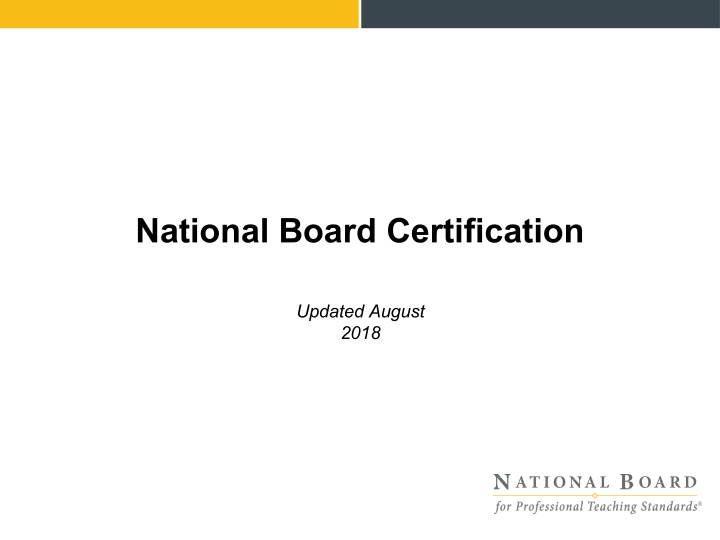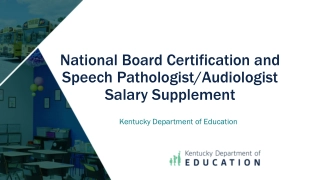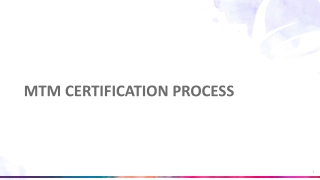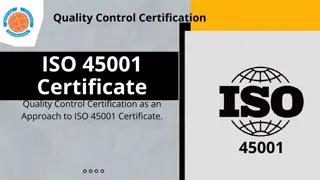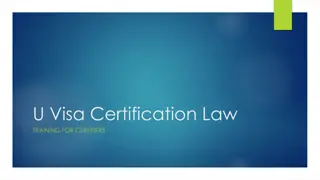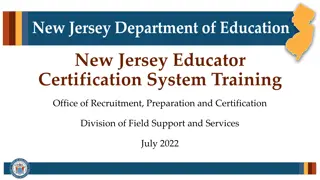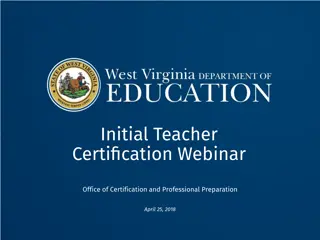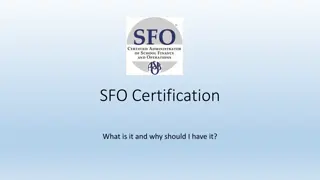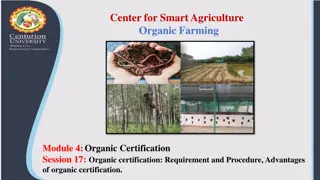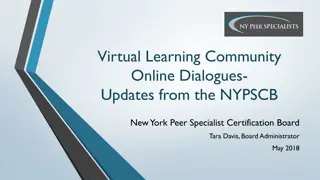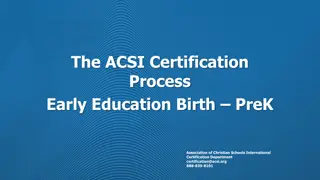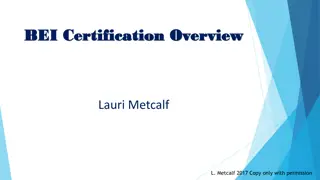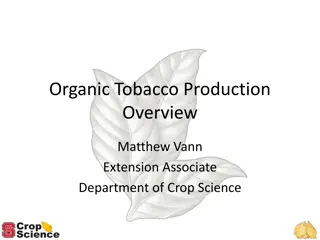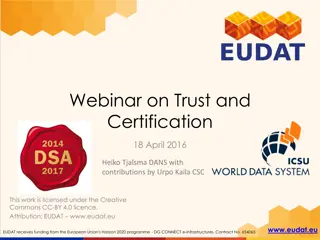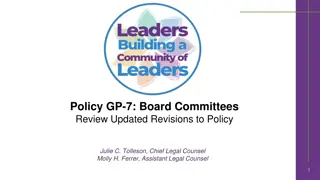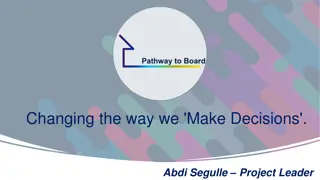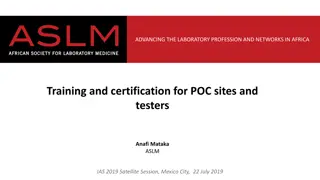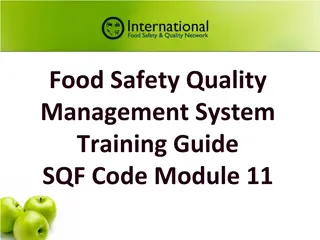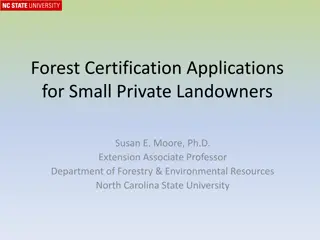National Board Certification Overview & Process Updates
National Board Certification is a voluntary system certifying accomplished teachers who meet rigorous standards. It advocates for education reforms and comprises five core propositions and specific standards. The certification process involves deadlines, a performance-based assessment, and a peer-reviewed portfolio. Flexibility exists in the timeline to complete the certification process.
Download Presentation

Please find below an Image/Link to download the presentation.
The content on the website is provided AS IS for your information and personal use only. It may not be sold, licensed, or shared on other websites without obtaining consent from the author.If you encounter any issues during the download, it is possible that the publisher has removed the file from their server.
You are allowed to download the files provided on this website for personal or commercial use, subject to the condition that they are used lawfully. All files are the property of their respective owners.
The content on the website is provided AS IS for your information and personal use only. It may not be sold, licensed, or shared on other websites without obtaining consent from the author.
E N D
Presentation Transcript
National Board Certification Updated August 2018
Our Mission Maintaining high and rigorous standards for what accomplished teachers should know and be able to do; Providing a national voluntary system certifying teachers who meet these standards; and Advocating related education reforms to integrate National Board Certification in American education and to capitalize on the expertise of National Board Certified Teachers. 2
The Five Core Propositions accomplishedteacher.org Teachers 1. Are committed to students and their learning. 2. Know the subjects they teach and how to teach those subjects to students. 3. Are responsible for managing and monitoring student learning. 4. Think systematically about their practice and learn from experience. 5. Are members of learning communities. Check out What Teachers Should Know and Be Able to Do 3
The Standards The Standards are the same with a few exceptions! CTE revised March 2015 2014-15 Revisions English LanguageArts Science Physical Education 5
The General Cadence Deadlines for 2018-19 Registration deadline: February 28, 2019 Full payment due: February 28, 2019 Withdrawal and refund deadline: February 28, 2019 ePortfolio window: April May 2019 Assessment center window: March 1 June 15, 2019 Scores released: On or before December 31, 2019 6
Performance Based and Peer-Reviewed Certification Process Assessment Center (40%) Portfolio (60%) 7
The FourComponents Evidence Component Name 1 Content Knowledge Assessment Center 2 Differentiation in Instruction Student Work 3 Teaching Practice and Learning Environment Effective and Reflective Practitioner Video 4 Assessment & Collaboration 8
Flexibility Completing the certification process may take anywhere from one to five years, depending on the approach. Candidates must attempt each of the four components within the first three years of candidacy. Candidates have up to two retake attempts for each component during the five-year window; retake years do not have to be concurrent or consecutive. Note potential point of confusion for five-year eligibility window: If a candidate does not complete their first attempt of all four components within the first three years of candidacy, they will not be eligible to continue their candidacy in years four and five. 9
Flexibility There is no minimum or maximum score requirement to retake a component. However, if a candidate achieves National Board Certification, retake attempts are no longer available. Candidates can have a year of taking no components; however, it does not extend the five-year eligibility window. The highest score received for an individual component will always be used for total score calculation. 10
Affordability The total cost of certification is $1,900, with each of the four components costing $475. Important price points $75 annual registration fee $475 per component $125 per retake for each part of Component 1 (constructed response exercises and selected response items) $475 per retake for Component 2, Component 3 and Component 4 11
Component 1: Content Knowledge (C1) A computer-based assessment to demonstrate knowledge and pedagogical practices unique to each certificate area. Three constructed response exercises (CRI) 45 selected response items (SRI) Five of which are embedded field test items that don't count toward the candidate's score 12
Time Limits for Component 1 SRI Section National Board judiciously considered the issue of adequate time limits when developing Component 1. RESULT: 15 minutes were added to the original 60 minutes (total of 75 minutes) for the section of 45 selected response items for six certificate areas. EA/ &AYA/ELA EA/ &AYA/MATH AYA/Sci-Chemistry, and AYA/Sci-Physics Constructed response item time limits remain unchanged. 13
Component 2: Differentiation in Instruction (C2) The instructions have been updated to: more succinctly explain the evidence to develop and submit; provide links to templates which allow candidates to enter information electronically for evidence; include a revised scoring rubric describing aspects of performance that are directly observable and measurable through submitted evidence and written commentary; and add/emphasize language that calls attention to theentry's focus on using knowledge of individual students to differentiate instruction. 14
Component 3: Teaching Practice and Learning Environment (C3) Combined two video-based portfolio entries into one to form the more streamlined Component 3. By reducing the length of the videos and by decreasing the length of the written commentaries, Component 3 is able to target significant aspects of teaching practice more effectively than before. With greater efficiency comes greater focus on the evaluation of classroom instruction and its impact on student learning in different educational contexts. 15
Component 4: Effective and Reflective Practitioner (C4) Opportunity to highlight abilities in developing and applying knowledge of students. Candidates gather information from a variety of sources about a group of students; show they use assessments to effectively plan for and positively impact students learning; and provide evidence of collaboration with families and caregivers, the community, and colleagues as well as evidence of contributions to learning communities to advance students learning and growth. 16
Minimum Section Averages In addition to meeting an overall total weighted scaled score, a minimum unweightedaverage score of 1.75 will be required of the four Assessment Center (C1) parts and Portfolio (C2, C3 and C4) section. The value of 1.75 sends the message to candidates and policymakers that: 1. National Board values both assessment center and portfolio aspects of teaching; and 2. Candidates cannot demonstrate little to no evidence of what each section measures and achieve Board certification. 17
Minimum Section Averages Specifically, the minimum section score requirements are: 1. Candidates must earn a minimum unweighted average score of 1.75 across the four parts of Component 1, which is also referred to as the Assessment Center section. The unweighted average score for the Assessment Center section is based on averaging the scores from the three CRIs and the SRI section. 2. Candidates must earn a minimum unweighted average score of 1.75 on Components 2, 3 and 4, which is also known as the Portfolio section. The unweighted average score for the Portfolio section is based on averaging the scores from C2, C3 and C4. 18
The Three Score Requirements To achieve National Board Certification candidates must meet each of the following three distinct score requirements: 1. assessment center section average score of at least 1.75 2. portfolio section average score of at least 1.75 3. total weighted scaled score of at least 110 IMPORTANT: Candidates must meet each of the above three score requirements to achieve National Board Certification. Meeting the section requirements of 1.75 is necessary but does not ensure a candidate will have the scores required to meet the total weighted scaled score requirement of 110. 19
Weighting The weights on the Assessment Center (40%) and Portfolio (60%) sections remain the same. The weights for the individual components were necessarily revised to reflect the new composition of thesesections: Assessment Center (C1) 40% Split equally between three CRIs (6.67 each) andSRI (20%) Portfolio (C2, C3 and C4) 60% Differentiation in Instruction (C2) 15% Teaching Practice and Learning Environment (C3) 30% Reflective and Effective Practitioner (C4) 15% 21
Weighting 22
World Languages Prerequisite In addition to the National Board candidate eligibility prerequisites, World Languages candidates must now meet the World Languages Standards for language proficiency by providing official American Council on the Teaching of Foreign Languages (ACTFL) certified ratings of Advanced Low or higher. Candidates are required to meet ratings of Advanced Low or higher on both the Oral Proficiency Interview (OPI) and the Writing Proficiency Test (WPT). See Guide to National Board Certification for more detail. 23
Score Report The score report illustrates whether all three minimum requirements were met. Reveals if the unweighted average score for each section and the total weighted scaled score was met. Displays feedback statements for C2, C3, and C4 if scores are less than 3.75. 24
Scoring Guide The Scoring Guide: Provides an overview of the assessment scoring process. How National Board assessors are trained and determine scores How to interpret the score report How to determine whether to retake a component How to file an appeal of scores Describes how the Five Core Propositions and Standards inform the assessment and scoring process. 25
Updated Score Calculator Use the online score calculator to help determine the impact of scores. 26
Maintenance of Certification The National Board recently revised its policy for maintenance of certification and will require Board- certified teachers to demonstrate their knowledge and skills every five years. (Adopted February 2015) This policy reflects efforts, like those taken in the recent redesign of the certification assessment, to make certification more affordable and efficient for all teachers, so that that it can become the norm in the profession. Also, it is aligned with the movement of 40 state licensure systems to a five-year renewal period. For additional information, including the rollout schedule, visit nbpts.org/national-board-certification/renewal/. 27
For additional information, visit us online or call 1-800-22TEACH! https://osiprodeusodcspstoa01.blob.core.windows.net/en-us/media/dc36f8aa-3677-4a31-aea2-04f8525a8131.png https://osiprodeusodcspstoa01.blob.core.windows.net/en-us/media/0da17e2a-9ed5-496a-b161-9fd4491ce5c7.png Subscribe to the blog and newsletter. 28
An accomplished teacher shapes a future and leaves a footprint in the sand. Akinyi J. Edmonds, NBCT Earning my National Board Certification was a professional turning point for me. Ambereen Khan-Baker, NBCT 29
